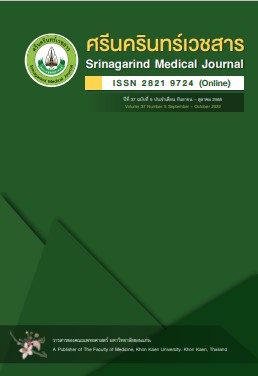The Concordance of the Patient's Severity Classification According to the Criteria of the Medical Department Comparison with the Criteria of Kudrang Hospital
Keywords:
COVID-19, small scale hospital, SARS-CoV-2Abstract
Background and Objectives: COVID-19 is a respiratory infection disease. An effective classification of the COVID-19 patient’s severity can help to allocate resources by appropriately. The purpose of this study was to examine factors affecting the severity of COVID-19 and compare the concordance of the severity level classification of COVID-19 patients according to the criteria of the Medical Department with the criteria of Kudrang hospital, Kudrang district, MahaSarakham province.
Methods: This cross sectional study was performed on Covid-19 patients who received services from Kudrang Hospital between July to September 2021 that categorized into two groups which are green and yellow groups by using Kudrang hospital criteria compared with the criteria of the Department of Medical.
Results: It was found that when using the Kudranghospital criteria for screening, the patients were divided into two groups, green and yellow group. It was found that there was a statistically significant relationship (p< 0.05) with age, blood oxygen concentration, fever, cough, and loss of taste. To consider the concordance of the data from the Kudrung hospital criteria compared to the criteria of the Medical Department, it was found that there was a statistically significant concordance (p < 0.01) at the correlation value (Kappa) of 0.494 with the confidence interval (95%CI) as 0.382-0.605.
Conclusion: Criteria for COVID-19 patients screening that developed from the criteria of the Department of Medical to be consistent with the context of small community hospitals could actually be applied without affecting the quality of patient treatment.
References
WHO. Coronavirus (COVID-19) Dashboard. [Internet]. 2022 [cited Jul 9, 2565]. Available from: https://covid19.who.int/
Petrosillo N, Viceconte G, Ergonul O, Ippolito G, Petersen E. COVID-19, SARS and MERS: are they closely related? ClinMicrobiol Infect 2020;26(6):729-34.
Li W, Moore MJ, Vasilieva N, Sui J, Wong SK, Berne MA, et al. Angiotensin-Converting Enzyme 2 Is a Functional Receptor for the Sars Coronavirus. Nature 2003;426(6965): 450-4.
Chu DKW, Pan Y, Cheng SMS, Hui KPY, Krishnan P, Liu Y, et al. Molecular diagnosis of a novel coronavirus (2019-nCoV) causing an outbreak of pneumonia. ClinChem2020;66(4):549-55.
Huang C, Wang Y, Li X, Ren L, Zhao J, Hu Y, et al. Clinical features of patients infected with 2019 novel coronavirus in Wuhan, China. Lancet 2020;395(10223):497-506.
Lauer SA, Grantz KH, Bi Q, Jones FK, Zheng Q, Meredith HR, et al. The incubation period of coronavirus disease 2019 (COVID-19) from publicly reported confirmed cases: estimation and application. Ann Int Med 2020;172(9):577-82.
Javanian M, Masrour-Roudsari J, Bayani M, Ebrahimpour S. Coronavirus disease 2019 (COVID-19): What we need to know. Caspian J Intern Med 2020;11(2):235-6.
Pascarella G, Strumia A, Piliego C, Bruno F, Del Buono R, Costa F, et al. COVID-19 diagnosis and management: a comprehensive review. J Intern Med 2020;288(2):192-206.
Chen N, Zhou M, Dong X, Qu J, Gong F, Han Y, et al. Epidemiological and clinical characteristics of 99 cases of 2019 novel coronavirus pneumonia in Wuhan, China: a descriptive study. Lancet 2020;395(10223):507-13.
Yang X, Yu Y, Xu J, Shu H, Xia J, Liu H, et al. Clinical course and outcomes of critically ill patients with SARS-CoV-2 pneumonia in Wuhan, China: a single-centered, retrospective, observational study. Lancet Respir Med 2020;8(5):475-81.
Wang D, Hu B, Hu C, Zhu F, Liu X, Zhang J, et al. Clinical characteristics of 138 hospitalized patients with 2019 novel coronavirus-infected pneumonia in Wuhan, China. JAMA 2020;323(11):1061-9.
Bai Y, Yao L, Wei T, Tian F, Jin DY, Chen L, et al. Presumed asymptomatic carriertransmission of COVID-19. JAMA 2020;323(14):1406-07.
Chan JF-W, Yuan S, Kok K-H, To KK-W, Chu H, Yang J, et al. A familial cluster ofpneumonia associated with the 2019 novel coronavirus indicating person-to-person transmission: a study of a family cluster. Lancet 2020;395(10223):514-23.
Department of medical. Guidelines for medical practice, diagnosis, care and prevention of infection in hospitals: In the case of patients infected with the coronavirus disease 2019 (COVID-19) for physicians and public health staff. [Internet]. 2022 [cited Jul 9, 2022]. Available from:https://covid19.dms.go.th/backend/Content/Content_File/Covid_Health/Attach/25640625085440AM_CPG_COVID_v.15_n%2020210625.pdf
Department of health. Growth standard chart for children 0-5 years old and 6-19 years old. [Internet]. 2022 [cited Jul 12, 2022]. Available from:https://nutrition2.anamai.moph.go.th/th/kidgraph
WHO expert consultation. Appropriate body-mass index for Asian populations and its implications for policy and intervention strategies. Lancet 2004;363(9403):157-63.
Onder G, Rezza G, Brusaferro S. Case-fatality rate and characteristics of patients dying in relation to COVID-19 in Italy. JAMA 2020;323(18):1775-6.
Pang WW, Pric EA, Sahoo D, Beerman I, Maloney WJ, Rossi DJ, et al. Human bone marrow hematopoietic stem cells are increased in frequency and myeloid-biased with age. Proc Natl AcadSci USA 2011;108(50): 20012-7.
Adil MT, Rahman R, Whitelaw D, Jain V, Al-Taan O, Rashid F, et al. SARS-CoV-2 and the pandemic of COVID-19. Postgrad Med J 2021;97(1144):110-6.
Kurpad AV. The requirements of protein & amino acid during acute & chronic infections. Indian J Med Res 2006;124:129-48.
Todd WTA, Lockwood DNJ, Nye FJ, Wilkins EGL, Carey PE. Infections and immune failure. Davidson’s principle and practice of medicine 19th ed. Philadelphia, United State. Elsevier Churchill Livingstone, 2002.
Aalinezhad M, Alikhani F, Akbari P, Rezaei MH, Soleimani S, Hakamifard A. Relationship between CT Severity Score and Capillary Blood Oxygen Saturation in Patients with COVID-19 Infection. Indian J Crit Care Med 2021;25(3):279-83.
GHS index. Advancing Collective Action and Accountability AMID Global Crisis. [Internet]. 2021 [cited Jul 9, 2022]. Available from: https://www.ghsindex.org/wpcontent/uploads/2021/12/2021_
GHSindexFullReport_Final.pdf
Nirattisai N, Kampangkeaw N. The challenges of Thailand’s public healthcare system during COVID-19 pandemic. J MCU Social Develop 2021;6(3):174-88.
Sathira-Angkura T, Leelawongs S, Srisuthisak S, Puttapitukpol S, Yonchoho N, Jamsomboon K. Development of nursing administration model in the COVID-19 outbreak situation of hospitals under the ministry of public health. J Health Sci 2021;30(2):320-33.
Kaewyasri K, Soontaraviratana B. The guidelines and impact from coronavirus disease (Covid-19) in Loei province. Acad J Community Public Health 2021;7(1):16-34.
Downloads
Published
How to Cite
Issue
Section
License
Copyright (c) 2022 Srinagarind Medical Journal

This work is licensed under a Creative Commons Attribution-NonCommercial-NoDerivatives 4.0 International License.




